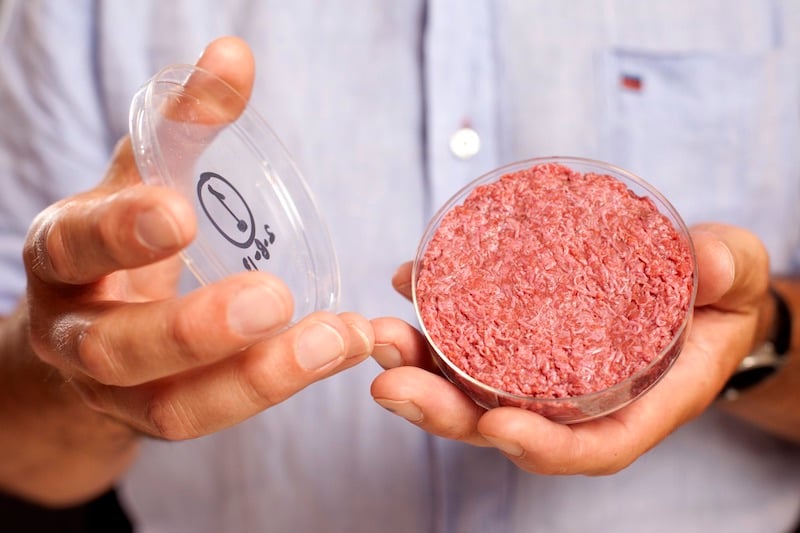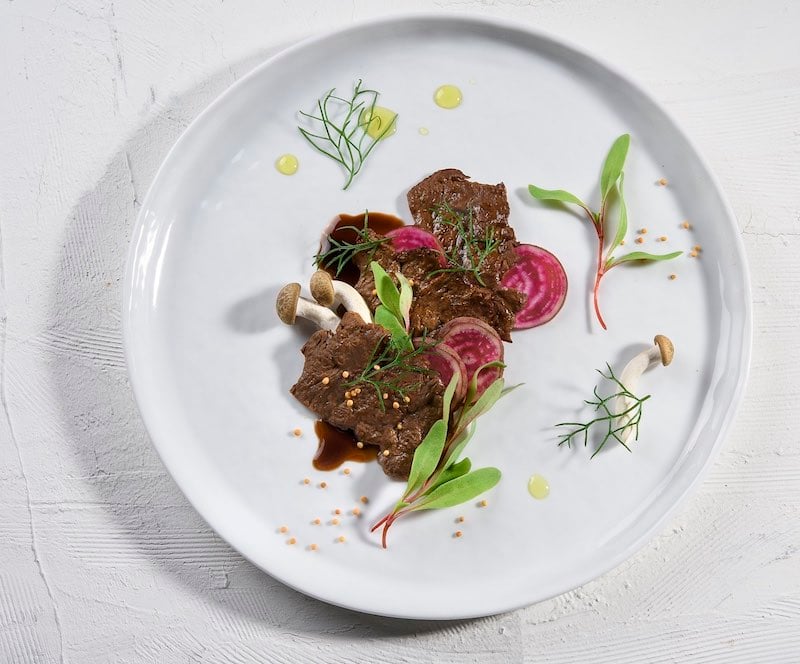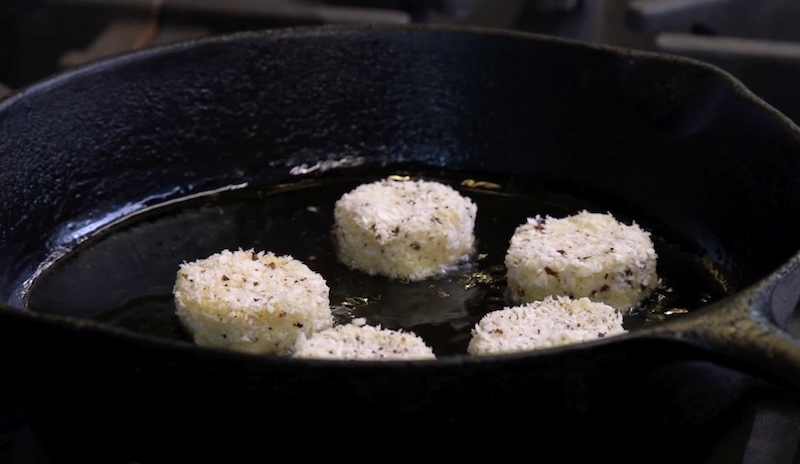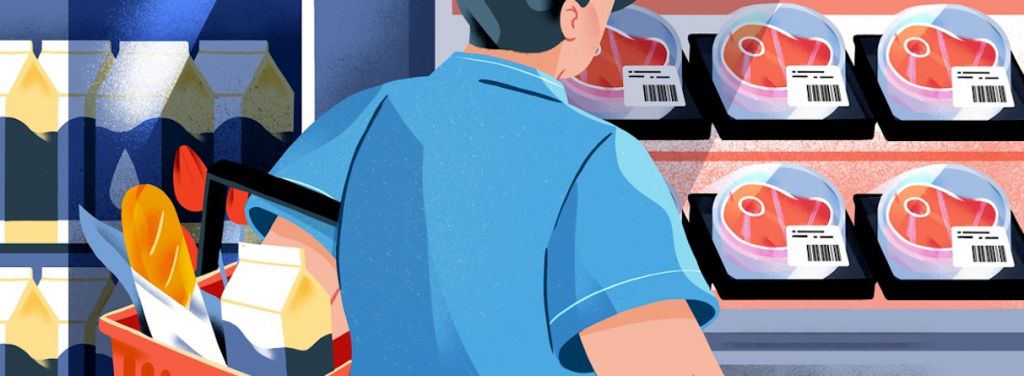It’s been 6 years since scientists grew the world’s first beef burger made without the cow in the lab. As it nears its supermarket debut, researchers around the world are joining the cellular agriculture movement and growing all sorts of animal products, including delicacies such as foie gras and bluefin tuna, without the animal.
As the world’s population keeps rising, the production of meat is becoming unsustainable. The average European eats 80kg of meat per year, while North Americans and Australians eat over 110kg per year. Many consider the Western world has reached ‘peak meat’, but developing countries are rapidly increasing their meat consumption and could soon match ours.
One of the alternatives proposed is growing meat without the animal. The product would technically be the same, but the use of land and water, as well as the pollution, could be significantly reduced.
Mark Post, Professor at Maastricht University, is known for the feat of creating the first lab-grown burger in 2013. Since then the technology has significantly advanced, and Post aims to start selling this ‘cultured’ beef burger in 2021 through the company Mosa Meat.

His work has inspired hundreds of people across the world to do the same with all sorts of animal products. “Until a couple of years ago we were the only ones working on this,” Post told me at the New Food Conference in Berlin last month.
“There has been a cultural change where people are becoming more aware of the issues with regular meat production, and that has attracted a number of investors from the meat industry,” he said. “I like to think we contributed a little bit to that with our first burger, when we brought it to mainstream attention.”
Beef seems to be the most common animal these emerging companies are trying to replace; it is known for being the most inefficient meat to produce and one of the biggest contributors to global warming. But technically, any animal product could be grown without the animal, so I set out to find what else is brewing in this exciting field.
Meat in all its glory
Whether you fancy a luxurious Kobe steak or just some deep fried chicken nuggets, you will likely have the option in the future to eat them slaughter free. Last December, the US startup JUST announced a partnership with Toriyama Ranch, a Japanese producer of Wagyu beef — a type of meat that includes the coveted Kobe steaks. JUST will use the Wagyu cow cells to grow meat, initially in the form of ground meat.
JUST is also working on growing chicken nuggets. A BBC reporter that got to taste a prototype nugget described it as tasting like chicken, but the texture not being quite the same yet.
So far most companies are focusing on making processed forms of meat, be it beef, pork or poultry — the Israeli Future Meat Technologies is making chicken kebab, while the Spanish Biotech Foods is making pork and poultry sausages and ham, among other products.
Processed meat gets around the difficulties of mimicking the structure of a meat cut, but some startups are taking on the challenge. In December, the Israeli Aleph Farms offered a taste of the first lab-grown steak. The small pieces were only half a centimeter thick, but the company sees it as an important step towards being able to make large cuts.

The main challenge for most of these companies is that the technology of cell culture was originally designed for medical applications. In medicine, there is no need to produce cells at the massive ton scale required to make meat, and making the production cheap is not as big a priority as with a commodity such as meat.
Thankfully, these pioneering companies are making it easier for more players to enter the field. “When we started [in 2017], we were able to find protocols for how to make muscle from stem cells, five years ago we couldn’t have found that,” said Benjamina Bollag, CEO of Higher Steaks, a British startup growing cultured pork. She believes that when the first products arrive in the market, there will be a new big wave of companies and technologies in the field.
Fancy some seafood?
If you can grow beef and pork, why not fish and seafood? The oceans would definitely benefit from a break from the huge environmental impact produced by intensive fishing. Culturing fish cells is not as popular — so far the only players are the startups Finless Foods, Wild Type and BlueNalu — but the potential is big.
Michael Selden, CEO of US-based Finless Foods, pointed out that even for the most sustainable sources of fish, transportation across the globe is responsible for high pricing and a big environmental impact. “We can make any fish locally,” said Selden. “Because for us it costs the same to make tilapia or bluefin tuna, we decided to go for the most expensive fishes.”

The exorbitant price that bluefin tuna can reach — earlier this year one specimen was sold for a record €2.8M — has also led to illegal overfishing and the animal is considered an endangered species. Growing its precious meat in a vat could help spare the species.
It turns out that it can be easier to work with fish cells than mammalian cells. They require lower temperatures and they can replicate indefinitely — something only stem cells can do in mammals. “We can also do personalized nutrition, with higher omega-3 content and different ratios of protein and fat customized to any dietary needs or wishes,” said Selden.
The technology could also be used to make fugu, a Japanese delicacy that can be deadly if the chef doesn’t prepare it correctly. “We could create fugu entirely without poison, not endangering people,” added Selden.
Taking over the food industry
No single delicacy seems to be out of reach for cultured meat companies. “We want to reinvent the most controversial French delicacy — foie gras,” said Nicolas Morin-Forest, founder of the startup Suprême. “Today, 67% of French consumers reject the way it’s produced.”
Founded just at the end of last year, Suprême is developing a method to obtain foie-gras using cells taken from duck eggs. Morin-Forest claims that the company has been successful in reproducing the effects of forced feeding at the cellular level, obtaining fatty liver cells without hurting any animals. The goal is to be offering this gourmet product by 2023.
Everyday commodities such as eggs and milk will also soon have counterparts that are created from cells rather than an animal. The company Clara Foods is growing egg white that is expected to launch at the end of the year, while startup Perfect Day recently signed a partnership with a big food processor to produce dairy protein through fermentation rather than milking.
In only a few years, cellular agriculture has moved from just a few curious academics to numerous companies seeking to challenge the status quo in the food industry. Major brands in the food industry are partnering with and investing in many of these companies as they see the potential in entering this food revolution.
“Food is very emotional and an essential part of our identity,” said Raffael Wohlgensinger, co-founder of LegenDairy Foods, a young German startup seeking to ferment dairy protein. “We’re on a mission to accelerate the transition towards a new food system for everyone, not just the vegans.”
Many of these companies plan for their first products to start entering our restaurants and supermarkets within the next couple of years. So far surveys on consumer acceptance of cultured meat have yielded very different results, ranging from 16% to 66% of people saying they would eat it.
The experts argue that as the products become available, their price becomes competitive with that of traditional products, and more people become familiar with them, consumers will be drawn in by the advantages cellular agriculture can have over traditional agriculture.
Images via Mosa Meat; Aleph Farms; Finless Foods





